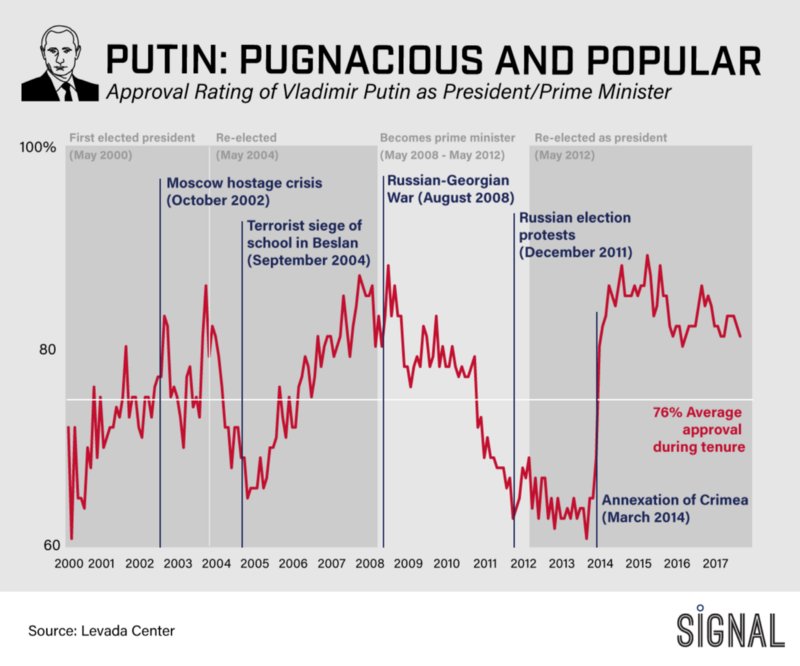Vladimir Putin’s popularity has ebbed and flowed over the 18 years he’s been in power — but nothing boosted him quite like the annexation of Crimea in 2014, which was genuinely popular among most Russians. But with Russia’s economy in the doldrums, shows of geopolitical resolve are an easy way for Putin to maintain popularity as he settles into his fourth presidential term (fifth term in power overall).
☰
More from GZERO Media
Economic Revitalization Minister Ryosei Akazawa heads to the United States for negotiations from Tokyo's Haneda airport on April 16, 2025.
Kyodo via Reuters Connect
As much of the world scrambles to figure out how to avoid Donald Trump’s expansive “reciprocal tariffs,” Japanese and Italian officials are in Washington this week to try their hands at negotiating with the self-styled Deal Artist™ himself.
US President Donald Trump alongside Federal Reserve Chairman Jerome Powell, back when the latter was the nominee for his current position, in Washington, D.C., USA, on November 2, 2017.
REUTERS/Carlos Barria
The US Supreme Court is set to reexamine an old decision that could have huge new consequences for the credibility and stability of the world’s largest economy.
U.S. Senator Chris Van Hollen (D-MD) speaks to the media during a visit to El Salvador to advocate for the release of Kilmar Abrego Garcia, a Salvadoran man deported without due process by the Trump administration and sent to the Terrorism Confinement Center (CECOT), in San Salvador, El Salvador, on April 16, 2025.
REUTERS/Jose Cabezas
Getting access to energy, whether it's renewables, oil and gas, or other sources, is increasingly challenging because of long lead times to get things built in the US and elsewhere, says Gregory Ebel, Enbridge's CEO, on the latest "Energized: The Future of Energy" podcast episode. And it's not just problems with access. “There is an energy emergency, if we're not careful, when it comes to price,” says Ebel. “There's definitely an energy emergency when it comes to having a resilient grid, whether it's a pipeline grid, an electric grid. That's something I think people have to take seriously.” Ebel believes that finding "the intersection of rhetoric, policy, and capital" can lead to affordability and profitability for the energy transition. His discussion with host JJ Ramberg and Arjun Murti, founder of the energy transition newsletter Super-Spiked, addresses where North America stands in the global energy transition, the implication of the revised energy policies by President Trump, and the potential consequences of tariffs and trade tension on the energy sector. “Energized: The Future of Energy” is a podcast series produced by GZERO Media's Blue Circle Studios in partnership with Enbridge. Listen to this episode at gzeromedia.com/energized, or on Apple, Spotify,Goodpods, or wherever you get your podcasts.
Populism, a changing workforce, and healthcare dynamics are driving economic transformation. What does this mean for businesses and consumers alike? Find out in Bank of America Institute’s latest trends report.
American backsliding, Trump-Xi standoff, Iran bombing, and more: Your questions, answered
April 16, 2025
Collage of Ian Bremmer, Donald Trump, and other world leaders.
Jess Frampton
If you feel like you're drowning in the 24-hour news tsunami lately, you're not alone. Headlines are moving at the speed of light, massively consequential policies are being announced (then rolled back) via social media, and longstanding global alliances seem to shift with each passing day.
The letters "DDPF" are seen tagged on a wall of the Aix-Luynes Penitentiary Center in Aix-en-Provence, France, on April 15, 2025.
REUTERS/Manon Cruz
A displaced Sudanese woman looks on as she sits next children at “Abdallah Nagi” shelter camp, which houses people mostly displaced from the capital Khartoum, in Port Sudan, Sudan, on April 15, 2025.
REUTERS/Ibrahim Mohammed Ishak
While the world is flooded with bad news, nowhere is it worse than Sudan, where the civil war hit the two-year mark on Tuesday. The fighting has left 13 million people displaced and over 150,000 dead, and there are reports of genocide in Darfur.
- YouTube
If the US won't work to return a wrongly deported man to El Salvador despite a Supreme Court ruling, are we headed toward a constitutional crisis? Donald Trump claims China-Vietnam talks are intended to "screw" the US. Does this run the risk of pushing Vietnam to China? Saudi Arabia plans to pay off Syria's World Bank debt. Could this be a major turning point for Syria's future and its ties with regional allies? Ian Bremmer shares his insights on global politics this week on World In :60.
© 2020 GZERO Media. All Rights Reserved | A Eurasia Group media company.
